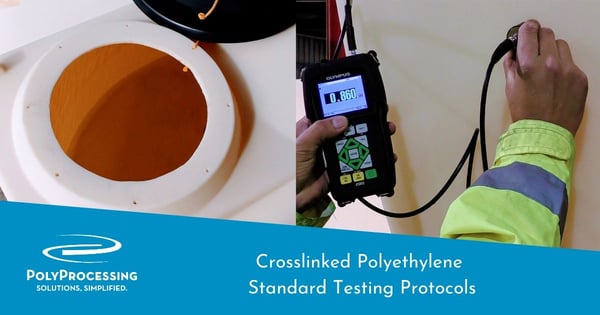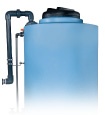Crosslinked Polyethylene - Standard Testing Protocols
We get a lot of questions about the standard testing on chemical storage tanks that we do at our facility. Vertical tanks larger than 500 gallons are extensively tested to ensure that they meet ASTM standards. Depending on customers’ needs, we also offer additional testing on our chemical storage tank systems.

Let's take a look at the types of chemical tank testing that Poly Processing performs, how we do it, and why these tests are so important in the chemical storage tank production process.
Four Major Types of Testing
At Poly Processing, we perform standard testing on all vertical, IMFO®, and SAFE-Tanks® over 500 gallons, per ASTM guidelines. There are four major standard tests.
ASTM Gel Test
According to the ASTM standard, at least 60 percent of a tank sample must consist of cross-linked molecules to be classified as cross-linked polyethylene (XLPE).
To perform the gel test, we take a small sample from the innermost 1/8” of the tank wall, measure it on a gram scale, and submerge it in boiling Xylene for 16 hours. The Xylene dissolves the linear polyethylene from the sample, leaving only cross-linked resin material. The sample is dried, remeasured, and compared to the original mass. The difference indicates the percentage of cross-linked polyethylene in the tank material.
ASTM Impact Test
The impact test determines the chemical tank's structural integrity through impact, rather than a chemical process. The goal is to verify that the material can withstand mechanical stress and other challenges associated with long-term chemical storage.
During the impact test, an XLPE sample is frozen overnight at -20 degrees F. It is then placed in a machine where a 20-pound “dart” is dropped at a certain foot-pound to create the appropriate impact. There are different calculations for the required impact. The thicker the tank material, the higher the impact.
The impact test produces a value that indicates the quality of the tank. A tank meeting ASTM D1998 Standards will provide greater longevity and resistance to higher mechanical stress.
Hydrostatic Test
The hydrostatic test verifies that the storage tank and its fittings are leak proof. This one-hour test is performed on all tanks 500 gallons and above, and any tank with fittings installed.
ASTM standards require that the tank sits for 30 minutes to verify that there are no leaks. At Poly Processing, our internal standard is to test for one hour, so that we can verify that the fittings and the tank itself can withstand hydrostatic pressure.
Ultrasonic Test
The ultrasonic test verifies a consistent wall thickness, within upper and lower parameters, of a chemical storage tank. We use a sonar instrument to calculate the thickness of the walls at various points around the diameter and vertically along the tank sidewall.
Standard wall thickness readings are taken at 0 degrees, 90 degrees, 180 degrees, and 270 degrees at 1-foot, 2-foot, and 3-foot elevations.
Additional PPC Testing
Poly Processing performs all of this testing at no charge. However, some of our customers request additional tests beyond the ASTM Standard, which we can provide for a small fee. These tests are often ideal for horizontal tanks, which have no standard. For our vertical, IMFO, and SAFE-Tanks, these tests go beyond the ASTM Standard.
Longer Duration Hydrostatic Test
Many of our customers request a hydrostatic test that exceeds the one-hour standard we typically provide. This test is performed exactly like the standard hydrostatic test, for up to 48 hours.
Barlow Wall Thickness Test
This test goes beyond the ASTM standard. We take the standard thickness readings from around the entire tank and send them to our engineering team for third-party verification. This test confirms through a third party that the entire tank meets the thickness standard, set forth by ASTM D1993.
This battery of chemical storage tank testing ensures that Poly Processing continues to manufacture superior cross-linked polyethylene tanks, no matter what chemical you need to store.
For more information on the testing we do, contact a chemical storage tank expert at Poly Processing today.
- November 11, 2019
- Topics: Certifications and Standards, Value Added
About Poly Processing
Posts By Topic
Tech Talk Podcast Episodes
Subscribe By Email
Recent Posts
- OR-1000™: Next Generation System for Oxidizing and Corrosive Chemical Storage
- Protect Your Facility and Your Bottom Line with a Chemical Leak Detection System
- PPC Installation, Operation, and Maintenance Manual: Ensure Tank Longevity
- How To Use The Chemical Resistance Guide
- Better and Safer Alternatives to Downpipes
Tank Configurator

Find the recommended tank and system components for your chemical storage challenge.
Configure a Tank Package


